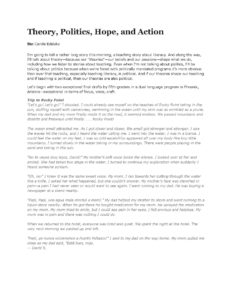Author: Carole Edelsky
Summary: This article is a great resource for study groups, inquiry communities, and professional learning of all types with a focus on English learners and writing. After introducing two pieces of “gorgeous” writing from fifth graders in a dual language classroom, Edelsky explains how this writing came to be. First she provides a theoretical overview focused on how people develop language and identity through authentic work within a community of practice. Then she describes the genesis of a different approach to writing development among a group of elementary teachers dealing with the question of “how you make schoolwork like real out-of-school work.” Offering seven “partial answers,” this article is highly accessible with the potential to generate myriad inquiries into issues about language learning, writing, power, and equity.
Original Date of Publication: 2003
Excerpt
Now what does all this have to do with literacy and schools? If learning to read and write is like learning a second language, then we have to figure out how to set up something like an immersion experience for written language in school.
That means extended engagement (time) with practices that are like what some community of practice does outside of school—journalists, short story writers, anthropologists, newscasters, poets—an engagement in practices that result in kids improving their reading and writing in general but that aren’t about learning to read and write in general. What they’re about (meaning) is being a certain kind of reader or writer—a poet, a short story writer, etc. That means ensuring support (through the first language and the home culture), and paying some attention to the bits and pieces of literacy (form) to help kids with what they’re engaged in.
And right along with that, we have to figure out how to get kids to be attracted to a community of practice that has literacy at its center, how to get kids to want to identify with that community of practice, to want to be “members” of the generalized community of book lovers, the generalized community of short story writers, the community of poets—at least for the short term—so they begin to take on a Discourse— not just “learn literacy skills” but take on the identity as they gain proficiency with the actual tasks, the work, the activity of people in that out-of-school community. At the least, to do that means we have to make school work as much as possible like the actual work of the community of essayists or journalists or investigative reporters or memoirists or poets or avid readers.
Related Resources
- Writing in Home Dialects: Choosing a Written Discourse in a Teacher Education Class
- “I’m a Writer Now!” The Who, Where, and When of an ELL Newspaper
- Narrative Writing Works Magic with Children Learning English
Original Source: National Writing Project, https://www.nwp.org/cs/public/print/resource/867
